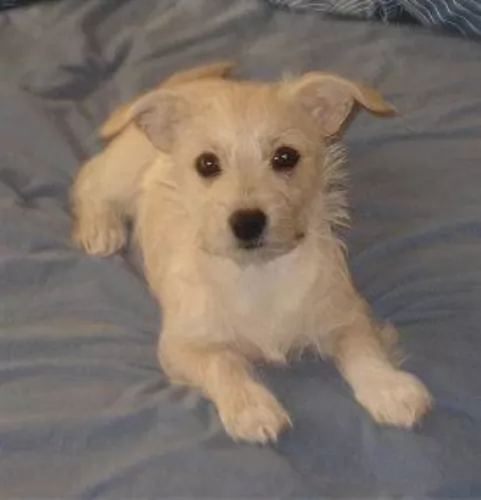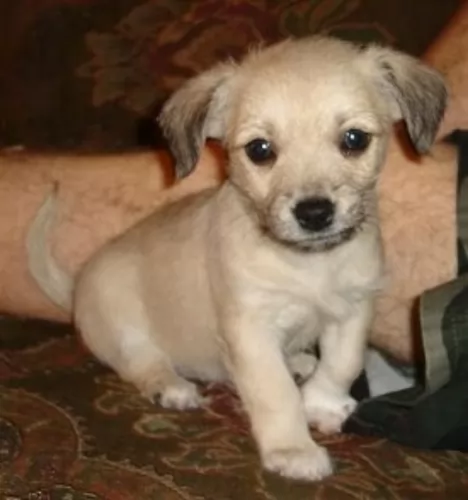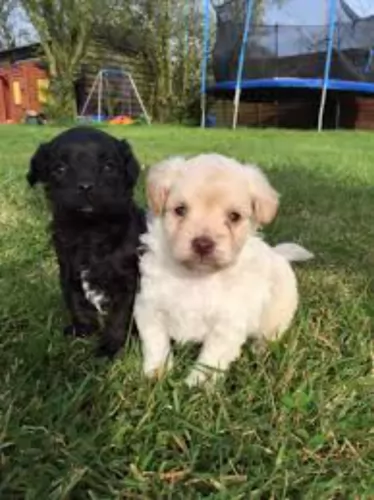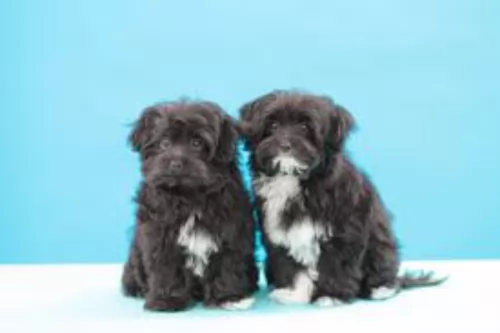 Petzlover
Petzlover Chipoo is originated from United States but Tea Cup Chihuahua is originated from Mexico. Both Chipoo and Tea Cup Chihuahua are of same height. Chipoo may weigh 6 kg / 14 pounds more than Tea Cup Chihuahua. Both Chipoo and Tea Cup Chihuahua has almost same life span. Both Chipoo and Tea Cup Chihuahua has almost same litter size. Chipoo requires Low Maintenance. But Tea Cup Chihuahua requires Moderate Maintenance
Chipoo is originated from United States but Tea Cup Chihuahua is originated from Mexico. Both Chipoo and Tea Cup Chihuahua are of same height. Chipoo may weigh 6 kg / 14 pounds more than Tea Cup Chihuahua. Both Chipoo and Tea Cup Chihuahua has almost same life span. Both Chipoo and Tea Cup Chihuahua has almost same litter size. Chipoo requires Low Maintenance. But Tea Cup Chihuahua requires Moderate Maintenance
 The Chipoo is not a purebred dog but rather a cross between the Toy Poodle and the Chihuahua. In the 1970’s the two breeds were crossed and the Chipoo was born. Chihuahuas have their origin in Mexico while the poodle is believed to come from Germany. This hybrid dog, because he comes form two purebred dogs is considered to be a designer dog. The Chipoo is not of course a purebred dog and is not recognized by the American kennel Club (AKC), but it is recognized by the designer groups and hybrid groups. These organizations include the International Designer Canine Registry, the American Canine Hybrid Club, the Designer Breed Registry, and the Designer Dogs Kennel Club.
The Chipoo is not a purebred dog but rather a cross between the Toy Poodle and the Chihuahua. In the 1970’s the two breeds were crossed and the Chipoo was born. Chihuahuas have their origin in Mexico while the poodle is believed to come from Germany. This hybrid dog, because he comes form two purebred dogs is considered to be a designer dog. The Chipoo is not of course a purebred dog and is not recognized by the American kennel Club (AKC), but it is recognized by the designer groups and hybrid groups. These organizations include the International Designer Canine Registry, the American Canine Hybrid Club, the Designer Breed Registry, and the Designer Dogs Kennel Club.
 Chihuahua is a state in the country of Mexico. From this state, the dog breed Chihuahua and the “teacup, or toy” chihuahua take their name. Interestingly the Chihuahua Club of America maintains that “teacup” Chihuahuas do not exist and that the size differential is normal for the breed. Chihuahuas or their ancestors have been around a very long time, sadly the exact origins of the Chihuahua are lost into the pages of history, but archaeological clues such as wheeled dog toys, art, and pottery link the Chihuahua to Mexico and to the Techichi dog. The Techichi dog at the time of the Spanish Conquistadors was sold for food (not unlike we sell beef or chicken) and also as a companion dog to death. Cortez even mentioned the Techichi dog in a letter sent back to Spain, describing them as being raised for food and sold in the marketplace.
Chihuahua is a state in the country of Mexico. From this state, the dog breed Chihuahua and the “teacup, or toy” chihuahua take their name. Interestingly the Chihuahua Club of America maintains that “teacup” Chihuahuas do not exist and that the size differential is normal for the breed. Chihuahuas or their ancestors have been around a very long time, sadly the exact origins of the Chihuahua are lost into the pages of history, but archaeological clues such as wheeled dog toys, art, and pottery link the Chihuahua to Mexico and to the Techichi dog. The Techichi dog at the time of the Spanish Conquistadors was sold for food (not unlike we sell beef or chicken) and also as a companion dog to death. Cortez even mentioned the Techichi dog in a letter sent back to Spain, describing them as being raised for food and sold in the marketplace.
When a death occurred a dog was chosen as a companion and cremated with the deceased. It was believed that the dog helped the soul of the decedent reach their eternal destination. The Techichi dog from which the modern-day chihuahua likely descended was very plentiful in the central American area that is now the country of Mexico and raised by the ancient Toltecs and later the Aztec people.
Chihuahuas are little dogs and come in a variety of coats, head shapes and even (within the designation small) sizes. The designation “teacup, toy or pocket” while not an official breed name is a useful descriptor, since they are the littlest of an already small breed and these minute pets, as puppies, may fit into a teacup or a pocket.
Fortunately while no longer a food source, the chihuahua is now sought after as a loyal and lively pet and companion.
 The Chipoo varies greatly in looks depending upon which breed it got most of its characteristics from. It is a toy dog, but it can have a curly coat or a straight one. It can be fluffy or wiry. It can be just about any color. All of them have Chihuahua tails but again depending on the mix, they can look like poodles or they can look like chihuahuas. They can vary in size from a very small toy to a larger sized small dog. You can have two Chipoos from the same litter and they will not be recognizable as littermates. However, they will all be adorable.
The Chipoo varies greatly in looks depending upon which breed it got most of its characteristics from. It is a toy dog, but it can have a curly coat or a straight one. It can be fluffy or wiry. It can be just about any color. All of them have Chihuahua tails but again depending on the mix, they can look like poodles or they can look like chihuahuas. They can vary in size from a very small toy to a larger sized small dog. You can have two Chipoos from the same litter and they will not be recognizable as littermates. However, they will all be adorable.
 Chihuahuas are small. Even the bigger ones are only about six pounds and a “teacup” or “toy” is often three pounds or less. Their bodies are slightly longer than they are tall, but even the tallest are not over nine inches. Chihuahua standing under five inches in height is not uncommon in the “teacup” or smallest of these dogs. They have two different head types and a domed skull. One type of head shape is like a deer while the other is described as an apple-shaped head. The apple-shaped heads are more popular than the deer shaped heads, although sometimes in the “teacup” especially the soft spot fails to close at maturity when growth is complete and the bones should knit, therefore leaving a soft spot in their skull – this is called a molera.
Chihuahuas are small. Even the bigger ones are only about six pounds and a “teacup” or “toy” is often three pounds or less. Their bodies are slightly longer than they are tall, but even the tallest are not over nine inches. Chihuahua standing under five inches in height is not uncommon in the “teacup” or smallest of these dogs. They have two different head types and a domed skull. One type of head shape is like a deer while the other is described as an apple-shaped head. The apple-shaped heads are more popular than the deer shaped heads, although sometimes in the “teacup” especially the soft spot fails to close at maturity when growth is complete and the bones should knit, therefore leaving a soft spot in their skull – this is called a molera.
Like different shaped heads chihuahua may have long hair or short-haired coats. The short-haired coats are smooth. The Chihuahua coats may be a large variety of colors ranging from black to white, with red, brown, fawn, cream and chocolate and they may be solid-colored, spotted or sabled. Personal preference is the determining factor on the type of coat a pet Chihuahua has since the breed does not have a preferred color, pattern, hair length or feel. Their muzzle (nose/mouth combination) is short and pointed. Chihuahua have have naturally erect pointed ears and large round eyes. A Chihuahuas tail is relatively long and mostly either curled up and over the back or carried up.
 Children friendliness very interactive with family but has been known to nip at small children and bark, so no not really
Children friendliness very interactive with family but has been known to nip at small children and bark, so no not really
3. Adaptability yes but they are better off in apartments and homes not out in the country where their size makes them targets for predators.
4. Learning ability average ability to learn but Chihuahua can be but stubborn which may impact ability and willingness to learn.
 Hybrid dogs often do better health wise than the original parents, but this is not true of 2nd and third generation crosses. However, this is not generally true of the Chipoo, as they are no longer bred poodle to chihuahua but rather Chipoo to Chipoo. They are basically healthy but face some issues such as:
Hybrid dogs often do better health wise than the original parents, but this is not true of 2nd and third generation crosses. However, this is not generally true of the Chipoo, as they are no longer bred poodle to chihuahua but rather Chipoo to Chipoo. They are basically healthy but face some issues such as:
This is what causes the tear stains on most small light-colored dogs. This is called Epiphora and is not an irritation in the eye, just overly active glands.
This is low blood sugar and can cause all kinds of problems for your Chipoo. This can be fatal if not cared for. It has many causes if the dog is not diabetic including Xylitol (sugar free gum and other) parasites, stress, diarrhea or bacteria.
This loose knee cap condition is found in many small breeds and can lead to arthritis and lameness.
 Chihuahuas live on average fourteen to eighteen years. There are some issues that may cause concern or lower life expectancy.]
Chihuahuas live on average fourteen to eighteen years. There are some issues that may cause concern or lower life expectancy.]
• Hypoglycemia (low blood sugar) is something to watch for. Low blood sugar can cause death in just a few hours but when caught is very easily treated. Some of the symptoms are being uncoordinated when walking, acting sleepy or lethargic, unfocused sight, fainting, having a seizure or having spasms in the muscles of the neck. First aid can right this condition with a sweet supplement like corn syrup, or honey. This is more common in puppies, but the teacup chihuahuas are susceptible.
• Hydrocephalus (water on the brain) can affect many toy dog breeds. The puppy or dog will appear to have an oversized head, and be slow (display lethargy) and grow slower than its littermates.
• Pulmonic stenosis (a heart condition) occurs when the right ventricle is impeded. Teacup Chihuahuas are also susceptible to heart murmurs.
• Collapsed trachea this occurs when the cartilaginous rings in a Chihuahua do not form completely or weaken. This can be hereditary or an acquired condition and occurs in other small breeds of dog.
• Molera – where after finishing growth a soft spot remains in the skull and the bones do not knit. As a puppy, the owner must remain vigilant about head injuries.
• Obesity (overweight). Most of the time this is a result of the Teacup Chihuahua being overfed. Obesity can contribute to a shortened lifespan and chronic bronchitis.
• Cold susceptibility. Cold weather can cause Teacup Chihuahuas to shiver or tremble when exposed and during cold temperatures, the dogs may need to wear a sweater and boots outside and cuddle with their owners under blankets or bask in the sun to stay warm.
• Infected or injured eyes. Due to the prominent eyes, exposure to irritants such as dust, allergens, or dry air can cause the dog to develop this beginning with watering eyes.
 Because they are prone to hypoglycemia, make sure you feed a high quality dry food and break it up into three or four small meals a day in order to maintain the blood sugar and avoid the drops and spikes that can cause them serious health issues.
Because they are prone to hypoglycemia, make sure you feed a high quality dry food and break it up into three or four small meals a day in order to maintain the blood sugar and avoid the drops and spikes that can cause them serious health issues.
This is common in the Chipoo and it makes it hard for the dog to absorb things through the skin such as topical ointments for ticks and flea prevention.
If the outside temperature is less than 50’, then your Chipoo needs to wear a sweater as they get cold very easily.
The Chipoo is an energetic little dog and he loves to go on walks, play in the yard and be with the family. Both the Chihuahua and the Poodle are very intelligent dogs and so this cross gets bored and destructive if not stimulated enough. He’ll be great at agility and obedience. Like the poodle you can teach him a lot of tricks.
 1. Feeding the Puppies. Puppies should be fed four times a day. Underfeeding can cause the issues of low blood sugar and overfeeding can result in obesity increasing the risk of other health complications.
1. Feeding the Puppies. Puppies should be fed four times a day. Underfeeding can cause the issues of low blood sugar and overfeeding can result in obesity increasing the risk of other health complications.
2. Feeding the Adult. Adult teacups are also vulnerable to hypoglycemia and obesity. Of course, the low blood sugar will be much more acute than obesity and need prompt care if it occurs. Adult teacups should be fed twice a day.
3. Points for Good Health. The chihuahua generally exhibits more vigor and endurance than pet owners expect from such a small breed of dog.
4. Games and Exercise for Teacup Chihuahua. Go ahead and run and play but remember even with the unexpected stamina and endurance this is a very small dog, small legs, using discernment, judgment, and restraint so the games and exercise is fun and builds health and is a special bonding time, without jeopardizing the sugar levels or causing exhaustion or misery.